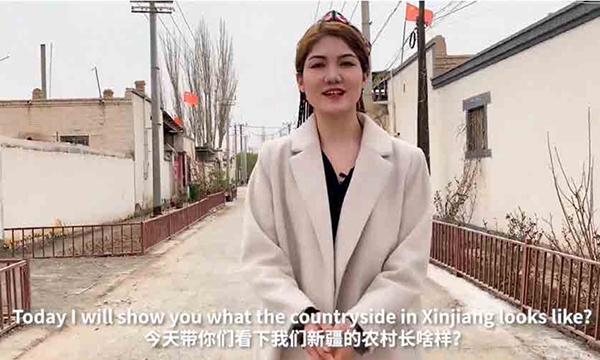The CCP believes that China’s ability to tell the party’s political story is still not commensurate with the country’s rise and its current place in the world. Xi Jinping has long stressed that the PRC needs to develop a global voice proportional to its ‘comprehensive national strength and international status’.
The Chinese Communist Party’s globally focused propaganda and disinformation capabilities are evolving and increasing in sophistication. This emerging approach to influence international discourse on China, including obfuscating its record of human rights violations, is of concern since it flies under the radar of US social media platforms and policymakers.
Youtube accounts are used by the Chinese Communist Party (CCP) to censor speech, promote disinformation and seed the internet with its preferred narratives. These accounts feature mainly female China-based ethnic-minority influencers from the troubled frontier regions of Xinjiang, Tibet and Inner Mongolia (frontier influencers or frontier accounts).
Frontier-influencer accounts are increasingly used as an emerging part of Beijing’s growing propaganda arsenal. They’re seen as a resource to be drawn on, but only if they’re harnessed properly.
YouTube is blocked in China but it is seen by the CCP as a key battlefield in its ideological contest with the outside world. YouTube’s use in China’s foreign propaganda efforts has intensified in recent years. Earlier it was deployed on domestic video-sharing platforms to meet an internal propaganda need, thus has now been redirected towards global audiences on YouTube to counter criticisms of China’s human rights problems and correct the country’s image.
China uses carefully vetted domestic vloggers with a more personal style of communication and softer presentation to be more convincing than traditional party media content, which is often more rigid and didactic. Frontier influencers represent what may be called ‘guerrillas or militia’ fighting on the flanks in the arena of public opinion. The party media may be seen as the ‘regular army’ ‘charging and killing on the frontlines.
Frontier accounts have been created since 2019. They feature content derived from CCP narratives. A false sense of legitimacy and transparency comes from their less-polished presentations. The videos appear to be the creation of the individual influencers, but is in fact professional-generated content and specialists.
Young female Uyghur, Tibetan and other ethnic-minority influencers with such an active presence on a Western social media platform is clearly unusual. But, they are carefully vetted and considered politically reliable. The content is tightly censored and tested on domestic video audiences before being published on YouTube.
The Case of Annie Gul
The ‘Annie Guli’ account’s videos about cotton production in Xinjiang, which feature English-language subtitles, have been among its best performing on YouTube – something Chinese propaganda experts have made note of. Accounts such as ‘Annie Guli’, which present the lives of ethnic minorities in China in a CCP-approved way, can be particularly useful in combating criticism from foreign governments, media and civil society.
One scholar noted that views of ‘Annie Guli’s’ Xinjiang cotton videos outranked Chinese state media outlet, the China Global Television Network (CGTN), on YouTube on the same topic. Similar videos by foreign vloggers in China, however, outranked them both.
Alongside foreign vloggers, carefully vetted domestic vloggers are increasingly seen as another key part of Beijing’s external propaganda arsenal. The increased use of a combination of these two types of vloggers is being encouraged in order to further buttress the propaganda work of party-state media.
Among rural vloggers, the two authors single out ‘grassroots internet celebrities’ such as Li Ziqi and Grandpa Amu as key examples of online video-content creators who already ‘proved the great attraction of China’s colourful culture to global internet users’ on YouTube. These vloggers depict Chinese people as ‘hard-working, brave, self-improving and self-reliant’ individuals.
Some Chinese scholars have noted that these types of accounts are supportive of Xi Jinping’s persistent call for external propaganda to ‘tell China’s stories well, present a true, multidimensional, and panoramic view of China, and enhance our country’s cultural soft power.’
During his visit to Xinjiang in July 2022, Xi emphasised the need to ‘launch multi-level, omni-directional, three-dimensional propaganda about Xinjiang directed abroad, perfect the work of “inviting in” and tell China’s Xinjiang story well.’
Monetisation
Since YouTube is blocked in China, the influencers based in the country are not able to receive advertising revenue through the YouTube Partner Program. the party content creators have made arrangements with YouTube to monetise content for frontier influencers, as well as for hundreds of other China-based influencers on YouTube.
Professional support also ensures that state-backed content ranks well in search results because search-engine algorithms tend to prioritise fresh content and channels that post regularly. The continuous flooding of content by party-state media, onto YouTube is aimed at outperforming other more critical but stale content about China.
This is clearly the Communist Party’s experiment to shape online political discourse. By such targeting the CCP can hide its affiliation with those influencers and create the appearance of ‘independent’ and ‘authoritative’ voices supporting its narratives.
Recommendations
The emergence of ethnic-frontier accounts on platforms blocked in China is a sign of Beijing’s willingness to experiment in building its global voice. Some recommendations as follows are in order:
• Social media platforms should broaden the practice of labelling the accounts of state media, agencies, and officials to state-linked, PRC-based influencers, in order to give users context and awareness about more insidious forms of state-backed content that lack independence and transparency.
• US social media platforms should stop partnering with, promoting and giving awards to MCNs that are conducting propaganda and disinformation work on behalf of the Chinese party-state.
• Until the Chinese government allows their services to operate in China, US social media platforms should stop their practice of allowing MCNs to monetise content from creators based in the PRC. MCN’s will still be able to post content on these platforms, but they should not be earning money for content as that effectively subsidises state-backed propaganda and disinformation efforts.
• Governments, social media platforms and civil society organisations which rely heavily on the research and insights produced by expert research groups, should increase their support to and funding of such groups. Research topics such as misinformation, information operations and propaganda are complicated, multi-language, data-heavy and rapidly evolving areas of study.
Conclusion
The Chinese Communist Party (CCP) has long deployed covert and overt online information campaigns to portray positive narratives about its domestic policies, while also flooding the global public discourse with disinformation and propaganda. But the potentially greater impact that influencers can have compared to party-state media or inauthentic social media activity is a point not lost on the CCP’s leadership, as well as on propaganda experts and scholars working inside the PRC.
THE GREAT FIREWALL
The blocking of YouTube, Twitter and Facebook in China has been inextricably linked with frontier issues and ethnic clashes since 2008. Before then, those websites were still accessible from China, although with some restrictions, but around the 2008 Beijing Olympics internal censorship increased steeply, and many websites were fully blocked.
In March 2009, Google reported that its video-sharing site YouTube had been blocked. Local media attributed the issue to the publication of a video depicting police brutality against Tibetans in Lhasa during the 2008 uprisings. The site had already been blocked a year earlier during the riots.
The 2009 Xinjiang riots caused an additional tightening of internet controls, and in July that year Twitter and Facebook were also blocked in the country. For months after the riots, the internet was completely shut across the entire region of Xinjiang, denying access to approximately 7 million internet users at the time.
Despite being inaccessible, foreign social media platforms are monitored by Chinese authorities, who use them to clamp down on dissent and hunt down critics even outside of China’s borders, especially if they hold Chinese citizenship. In the past decade, there have been many reports of people being harassed, interrogated, arrested and detained for posting about issues sensitive to the CCP on Chinese and foreign social media.
One of the most well-known cases is that of Zhang Zhan, a citizen journalist who became famous for her early reporting of the
Covid-19 outbreak in the city of Wuhan. In May 2020, after broadcasting about the impact of the lockdown on YouTube, Zhang was detained and tortured before being sentenced to four years in prison for ‘picking quarrels and provoking trouble’.
For minorities in Xinjiang, state control over online activities is even tighter. Former detainees have reported that having a virtual private network (VPN) and/or having a foreign messaging app such as WhatsApp installed on their phones had been used as a pretext for detention.
Watching a video filmed abroad also raises red flags, as well as simply speaking with someone overseas. Forms of religious expression such as wearing a hijab or wearing a scarf in the presence of the Chinese flag have been reported as reasons for arbitrary detention.
Because of the government’s discriminatory crackdown targeting Turkic Muslims and other ethnic and religious groups, most people don’t feel safe to express their faith online or to have a presence on foreign platforms. And, while the closely vetted vloggers featured in this report seem to have special permission to post content on YouTube, they still avoid making any direct reference to their faith or specific religious practices.


















